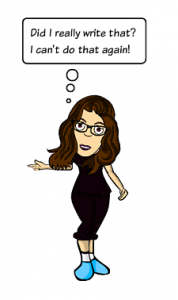I recently read an interesting article by Dr Julian Kitchen, Associate Professor in teacher education at the Brock University in Canada. As I read I found many links between Kitchen’s work with preservice teachers and the work I am trying to do with practicing teachers.
Kitchen quotes Dewey: “…education is development from within” (Dewey, 1938, p. 17). This resounds with thoughts about learning versus development. Development is seen as something that comes from the outside, that someone “does it” to the teachers whereas learning is something internal, it is the union of stimuli from outside with the personal knowledge, experience, intelligence and beliefs of the teacher. This learning is of course something gradual which develops slowly, at an individual pace. This is far from the “boom” of “being developed” at a seminar or short course.
According to Kitchen “Relational teacher education is a reciprocal approach to enabling teacher growth that is respectful of the personal practical knowledge of preservice teachers and builds from the realization that we know in relationship to others. Relational teacher education is sensitive to the role that each participant plays as teacher and learner in the relationship, the milieus in which each lives and works; it stresses the need to present one’s authentic self in relationships which are open, nonjudgmental and trusting” (Kitchen, 2005, p. 196).
When I read this article, many of the things he wrote seemed to suit my view of my teaching and gave them a name. I had never heard of “Relational Teacher Education” before and hadn’t even thought about giving a name to my style of teaching. After completing my MEd thesis, I did make a conscious decision to respect the knowledge and experience the teachers bring with them and I even talk about this explicitly throughout the course. Many of the comments I receive from teachers at the end of my courses relate to these points.
I also strongly believe in the social aspects of learning. In the past my courses have been built on sharing classroom experiences and I will definitely build on that this year. I will dare to give more time for sharing.
I am interested to explore the way that each individual (including myself) is both a teacher and a learner in the course.
Kitchen identifies seven important characteristics of relational teacher education:
“1. Understanding one’s own personal practical knowledge
2. Improving one’s practice in teacher education
3. Understanding the landscape of teacher education
4. Respecting and empathizing with preservice teachers
5. Conveying respect and empathy
6. Helping preservice teachers face problems
7. Receptivity to growing in relationship”
(Kitchen,2005, p. 196).
Some thoughts on these issues:
1. I must be committed to examining my own knowledge and experience. One of my advantages is that I really teach children and can try out the things I am talking about. I must remember to find more time to reflect on my own teaching both at school and in the course.
2. I am interested and committed to improving my teacher education. It took me years to feel comfortable with the title “teacher educator” but that indeed is what I am. I think I am improving over the years and this year, through my intensive written reflections, I should improve even more. What I should do is find a significant friend to read those reflections and discuss them.
3. I am trying to understand the landscape of teacher education – and my thesis is part of it. I don’t like dealing with politics but I have discovered that teacher education is a highly political issue. Maybe all teaching is? I have been leaving the policy documents to the end in my literature review and I think I should dive into them.
Kitchen writes: “I began to discover that we as teachers often have been told that our stories are inauthentic and that experts have the answers. I became aware that we have been forced to obey “objective” studies, even though they often run contrary to our classroom experiences. I awakened to the realization that we must discover our own voices because, as Roland Barth (1990) observes, “When teachers stop growing, so do their students” (Kitchen, 2005, p. 199).
My aim is to add to the growing body of teacher stories, stories which may at some stage be publishable. Teachers must know that they can learn from writing and rewriting their teacher stories and reading and responding to those of their peers.
Kitchen (2005) explains that “Relational teacher development and education recognizes the roles each participant plays as teacher and learner in the relationship and is sensitive to the milieus in which each lives and works (p. 200). I have often stated in my reflections that I am acting as teacher and learner in my sessions. I learn from each teacher I lead. Through my thinking about their work I reflect on my own and alter my own classroom practice and workshops.
This article contains a letter Kitchen wrote to his preservice students before meeting them in one of his courses. He writes: “This letter both invited preservice teachers to reflect on their tacit knowledge (Polanyi, 1958) and expressed my personal professional commitment to developing meaningful and respectful personal professional relationships with each of them. By sharing my experiences, I illustrated my engagement in reflective practice. By listening authentically to their stories, I modeled respect for teachers as curriculum makers. By providing them with reflective tools, I assisted my preservice teachers as they explored their personal practical knowledge (Connelly & Clandinin, 1988)” (Kitchen, 2005, p.200).
I would love to be able to write this kind of letter to my participants and for them to write a reply to me as their first task. This letter exchange could open up the communication between us and leave me with a far clearer sense of the teachers sitting in front of me than the dry questionnaires I have today. I wonder though if they take me as sincere before they get to know me? Israelis are so cynical. It certainly would take a lot of the talking out of the first stages of the course. I think I should give it a go – using Kitchen’s letter as a guide.
Kitchen writes “By responding personally and rigorously to their reflections on past and present experiences, I attempted to assist them in reconstructing their cognitive structures and their approaches to teaching. By engaging them in cooperative learning and team-building activities, I helped to foster a sense of community among those in the class” (p. 200-201).
What do I try to achieve in my own responses to teachers? I make connections between practice and theory, give names to the things the teachers are talking about, and aim to elicit extra or deeper understandings.
Cooperative learning is also a relevant issue – I am continually searching for ways to deepen this collaborative experience in just 30 hours.
Kitchen explains that relational teacher education is based on respect. This respect is many things – starting on time (maybe with something that they won’t want to miss?), not wasting teachers’ time , making the most of their time. This need for respect is obvious in many ways but not always easy. When a teacher arrives without a pen and notebook, when she sits knitting throughout the whole session, when I have to fight to get a word in…
“My constructive criticism of student work is not an uncritical stance. Typically, in responding to personal portfolios, I mirror back my understanding: I note patterns that extend across their metaphor and look for five critical incidents and five personal narratives, I respond to their interpretations, and I share related stories from my experience. Each of these interactions serves as an opportunity for dialogue and professional growth for both preservice teachers and the instructor. Although this is a time-consuming process, the students respect the results. When they nominated me for Professor of the Year in 2001, they spoke of my “rigorous expectations,” “constructive criticism,” and “in-depth personal analysis of both content and structure.” At the same time, I deepen my understanding of teaching and learning by hearing what my students have to say” (Kitchen, 2005, p. 202).
Kitchen isn’t boasting here, he is explaining what works in his courses and according to the feedback from my courses, this is similar to some of the remarks I have received. I too learn from reading and responding to my teacher-students.
After getting excited about these inspiring concepts, I return to earth and ask myself: Is any of this possible in a 30 hour course?
Reference:
Kitchen, J. (2005). Conveying respect and empathy: Becoming a relational teacher educator. Studying Teacher Education, 1(2), 194-207.







